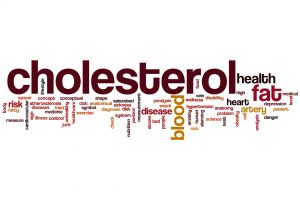food habits for cholesterol

Cholesterol is an essential component of cell membranes. Moreover, It is essential for many of the body’s metabolic processes, including the production of hormones, bile, and vitamin D. It is produced when foods containing oil and fat are digested. It is also produced in the liver. The body is very good at making its own cholesterol there’s no need to eat foods high in cholesterol.
LDL
Low Density Lipoprotein
The cholesterol in low-density lipoproteins (LDL) is known as the ‘bad’ cholesterol which contributes to heart disease because it gets deposited to the wall of arteries supplying blood to the heart and narrows them.
HDL
High-density lipoprotein
High-density lipoprotein (HDL) cholesterol is known as the ‘good’ cholesterol because it keeps LDL levels in check.
Triglycerides
Bad Cholesterol
Triglycerides are another type of fat in the blood. There is evidence to suggest that some people with higher levels of blood triglycerides are at increased risk of CHD (Coronary Heart Disease).
What should be done?
Try our method called Reduce and Introduce!!
Reduce
- fatty meats
- processed meats like salami and sausages
- snack foods like chips
- most takeaway foods, especially deep-fried foods
- Cakes, biscuits, and pastries.
- alcohol intake to no more than one or two drinks a day (Avoid binge drinking)
- Smoking (Stop smoking or seek the help of healthcare professional to help you quit smoking
- excess body fat (loose weight to ideal BMI)
- Keep Blood sugar levels under control (reduce too much carbs and eat balanced meals)
Introduce
- Consume polyunsaturated oil (for example, sunflower or safflower oil)
- lots of oats and legumes in a daily diet (can lower LDL by 5% !!)
- Chickpeas, alfalfa sprouts, and other foods have food components like saponins
- Sulphur compounds (like allicin – found in garlic and onions) may also have a positive effect in lowering cholesterol levels
- Plant Sterols (Sunflower and Canola seeds, vegetable oil, nuts, legumes, cereals, fruit, and vegetables
- 30 minutes or more of moderate-intensity physical activity on most, if not all, days of the week
- Shoppers concerned about the amount of saturated fat in foods can look for products with the Heart Foundation Tick as a healthier choice.
REFERENCES:
- http://www.betterhealth.vic.gov.au/bhcv2/bhcarticles.nsf/pages/Cholesterol_explained?open
- http://www.betterhealth.vic.gov.au/bhcv2/bhcarticles.nsf/pages/Cholesterol_genetic_factors?open
- http://www.heartfoundation.org.au/your-heart/cardiovascular-conditions/Pages/high-cholesterol.aspx
- http://www.heartfoundation.org.au/healthy-eating/fats/Pages/cholesterol.aspx







Crabs are a good source of the omega-3 fatty acids that help lower
blood pressure, reduce the rick of heart diseases, lower triglycerides, enhance your
immune system and lower the risk of getting cancer. That is because they are rich in saturated animals
fats, making you gain excessive weight that is also linked to prostate troubles.
I have observed patterns among those who have
successfully reversed health problems.
My husband has just been diagnosed with high cholesterol and I’m trying to find ways to help him lower it. And sadly, he’s grown up in a family that absolutely loves fatty, fried food. Anything in moderation is fine, but he’s addicted to them. I got him to be able to quit smoking a few years back, that was a struggle, but it got done. Persistence, on my end, will pay off. I’m going to get him started by giving him some omega supplements. But very good information here. Thanks for sharing this.
Great article, just what I was looking for.
Great I will try to use this information my dr does insist I go on medication for my cholesterol